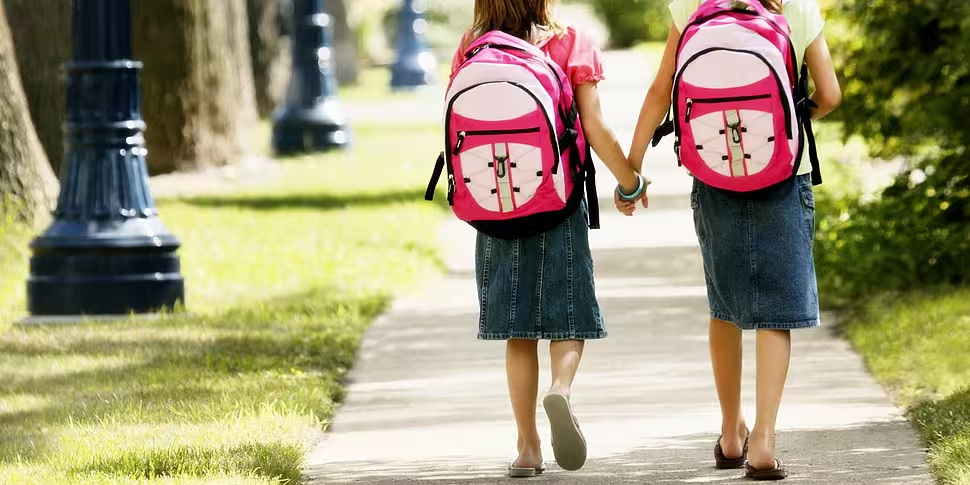On this week's 'Parenting' segment on the Moncrieff show, one listener sought advice about how to comfort their 10-year-old who is worried about starting puberty.
Joanna Fortune, psychotherapist specialising in Child & Adult Psychotherapy, joined Moncrieff to answer this and other listeners' questions.
The question:
"My 10-year-old daughter in recent months is saying she is fat and that she hates her body. She is tiny and physically fit. She never hears me criticise my own body or mention diets or weight. I don’t know where this is coming from. She has also been saying she doesn’t want to grow up. She’s afraid of getting breasts and her body changing. I have always talked freely about that and bodies in age-appropriate language but when her class got a talk last year on puberty she came home sobbing and was desperately upset every night for weeks after.
"Other girls in her class thought it was all great fun and begged their mums for training bras. She was one of the youngest in her year, and this was one of the reasons we moved her to another school and she is repeating the same year. Her new classmates are her age or younger. I thought this would help as she wouldn’t be exposed to all the older girl talk about boys, boobs, etc but she is still saying she hates her body and doesn’t want to grow up.
"I’m fearful she will develop an eating disorder to try to stop puberty. I noticed this week she is getting breast buds on one side and she is very upset at nights in particular."
Listen and subscribe to Moncrieff on Apple Podcasts, Google Podcasts or Spotify.
Joanna’s response:
“The poor thing and that’s so much to deal with. I’m really struck here as a parent, as a mam, you’re saying you don’t know where she gets it from because you don’t criticise your body, you don’t mention diets or weight - which is great. These are things we do need to be consciously aware of.
“But as well as consciously not criticising our bodies we also need to be very conscious that our children hear us compliment our bodies and speak kindly about our bodies. So it’s not enough not to say bad things, we have to say also ensure that they hear us be good and kind and speak about what our bodies can do over what they look like.
“That we appreciate the health and the flexibility and the fitness and the stamina of our bodies. You know and also be aware that we can do our bit as parents but we are always competing against a body industry… That is a multibillion euro industry targeting our children from the youngest ages. So this is something [where] not saying something, not mentioning the diet word isn’t always enough.
“And I think that’s a part of this but I don’t think it’s all of it because some of linking her body disdain, if you like, is actually to do with pending changes that she’s not going to be able to stop and the awareness of, ‘Oh, this is coming for me whether I want it there or not.’ And that sense of being out of control about it.
“And you’re right, when we feel out of control about something, it’s quite natural that we would switch our focus to, ‘What aspects of this can I control?’ And the life changes around puberty, the body changes, the hormones, the mood, everything associated, basically they’re unfamiliar, they’re unpredictable in terms of the when and the how. The fact that they’re coming is predictable but when and what will it feel like? That’s quite intangible and then it can elicit all kinds of fear and anxiety associated. And she may well, and it’s not unusual at her age at all, want to hold onto the comfort of childhood… And kind of fearful of losing control of her body, which again I can understand.
“You know, I really think that girls this age can become very fearful of what they perceive as the disempowerment of puberty, ‘My body’s going to change shape and size, I’m going to have behave in a certain way, I’ll have to be conscious of how I appeal to others. I’m going to experience menstruation’, I mean there’s a whole lot to get your head around.
“And we really want to try and restructure this to focus on how, ‘What does your changing body… mean for you in a positive strength focused way?’ And structure it with excitement about what growing up brings, new opportunities, new independence, look at all the things you’ll be able to do that you weren’t able to do when you were younger.
“I think you can also connect with her through positively reframed stories of your own experience, while acknowledging that you were also nervous and uncertain and fearful but looking at, ‘While this was difficult and it took me a while to get used to it, I actually did get used to it and I able to do all these other things .’ Because lack of control over our bodies is a scary feeling in all kinds of ways.”
Main image: Girls walking to school. Picture by: Con Tanasiuk/Design Pics via ZUMA Wire.









